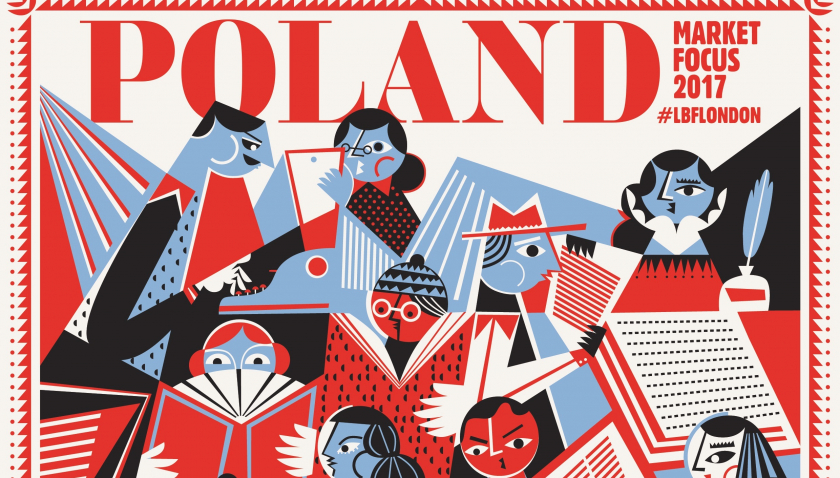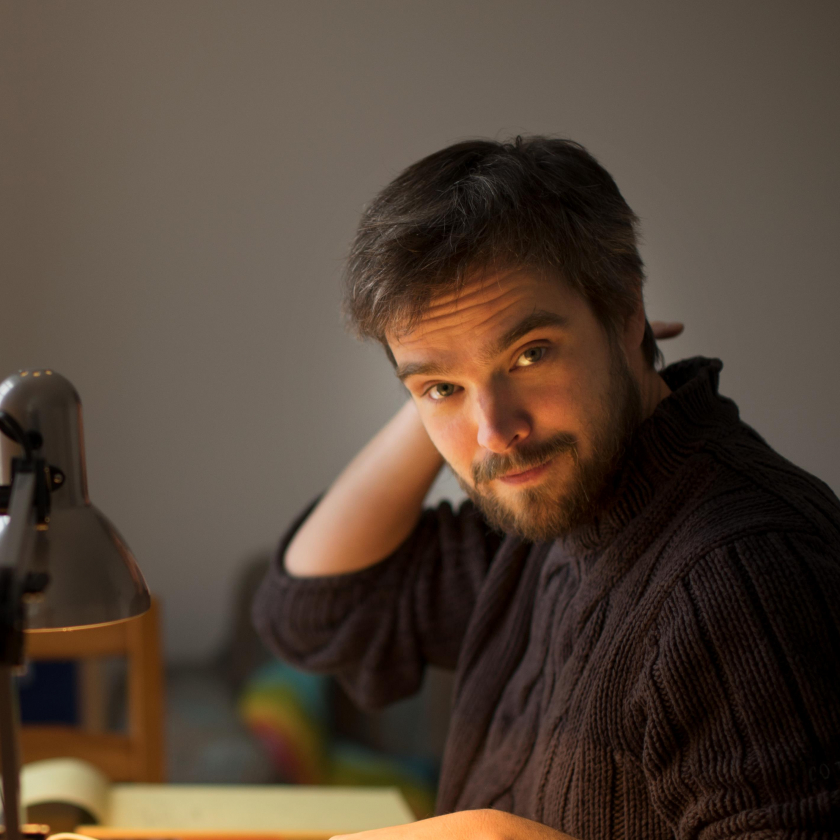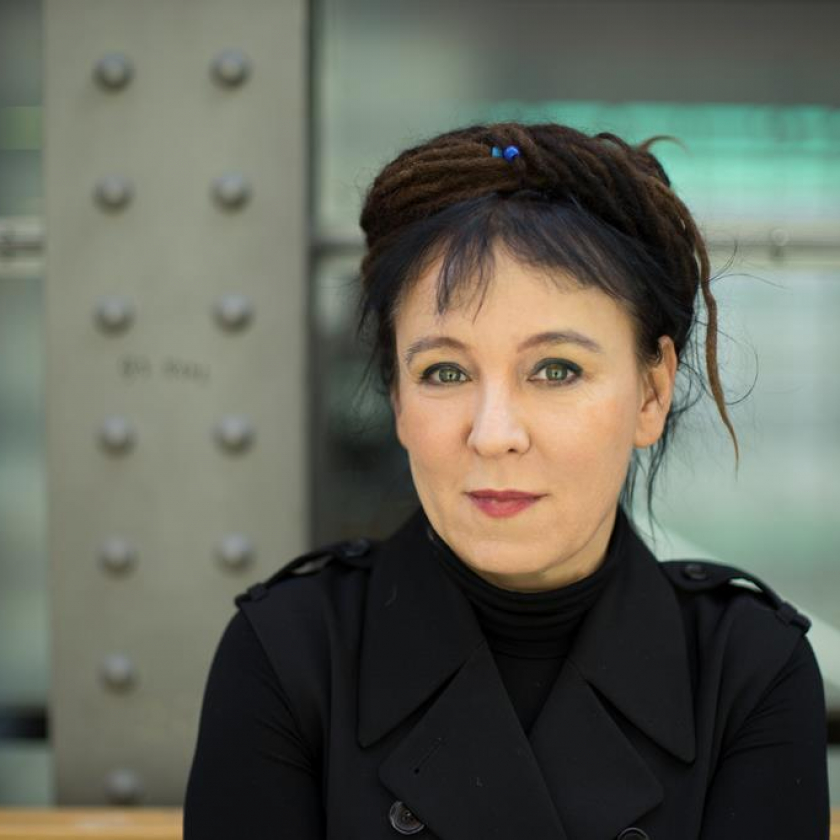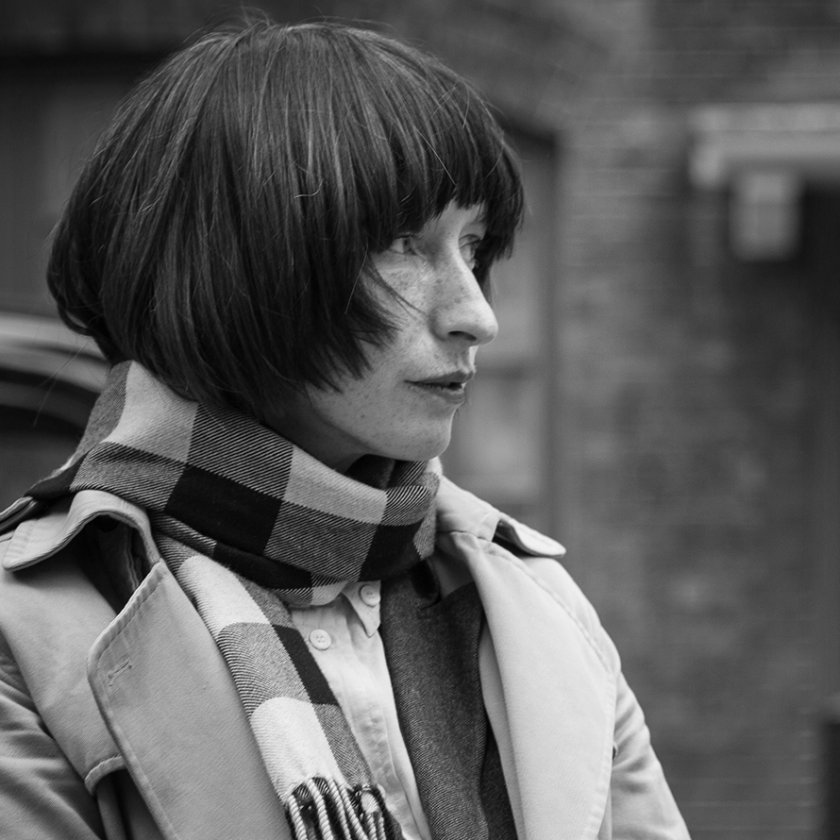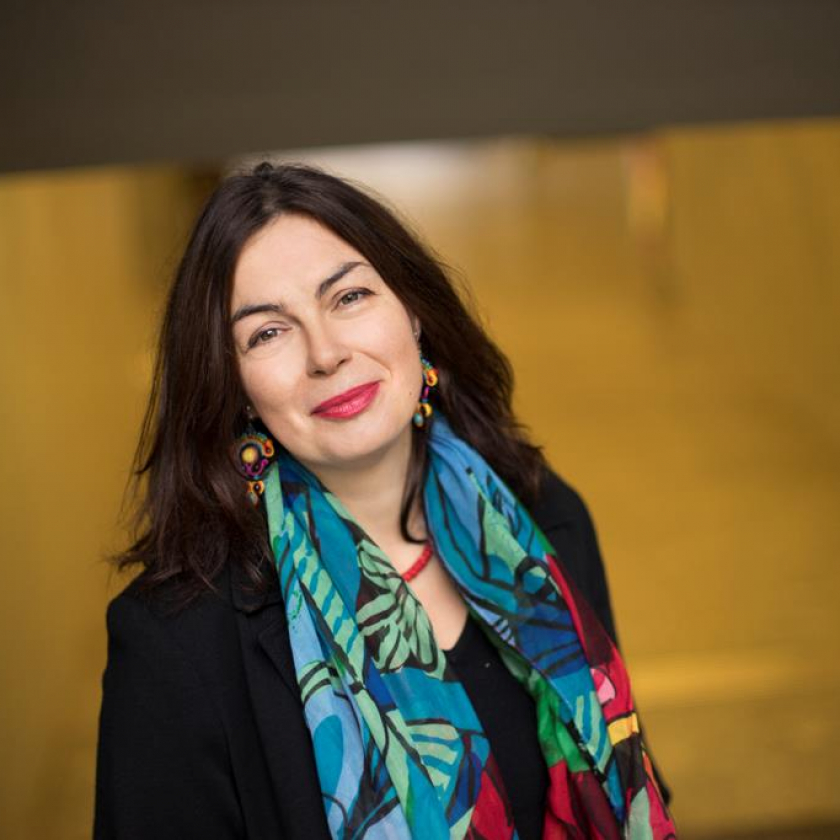Day 2
Blog 1
Poet’s log Stardate March 15 2017, London Book Fair (LBF) Poland. Nobody sleeps much during LBF Poland. Should I mention vodka hour at the elegant Polish Pavilion amidst the conifers? Best not.
I am still buzzing from last night’s cultural event on crime writing in Poland at the British Library. Olga Tokarczuk is telling us how ‘easy’ it is to write crime fiction, like turning out cakes from a mould, once you’ve mixed in a little hypothesis, added catharsis.
Meanwhile Zygmunt Miłoszewski the crime writer sits solidly next to her without moving a facial muscle! What a double act, what charm, humour, intelligence. Claire Armitstead from the Guardian asks them searching questions. Antonia Lloyd Jones reads extracts from her superb translations of their books. Marta Dziurosz is on hand, as at other events, for instant interpretation.
One thread in all the discussions at the Fair is how writers are responding to the political situation in Poland. Miłoszewski comforts us that all the culture in Poland is being produced by gay people, left wingers - and eco-feminists - so the establishment is stuck with them. Both authors employ irony and black humour while dealing with hitherto taboo and heavy subjects: anti-semitism, xenophobia, rape and male violence, environmental issues, animal rights. Miłoszewski tells us that he is a feminist and his wife is a feminist – ‘you have no idea’ he adds. Refreshingly, he sees it as the responsibility of men to put an end to male violence and domination.
Tokarczuk differentiates between polemic and fictional writing. She talks of a deeper level which literature reaches, below the everyday political level - a longer term time-frame. With uncanny prescience her book, Drive Your Plough Over the Bones of the Dead, published almost a decade ago has become highly topical with Poland’s mindless destruction of its primeval forests. The book has recently been made into a film ‘Spoor’ by Agnieszka Holland.
In the same way that children’s books use animals and fantasy to convey difficult subjects in a more palatable way so the adult crime novel tackles political issues through metaphor and, as Zygmunt Miłoszewski points out, is an excellent vehicle for reflecting society by means of an ostensibly popular, ‘lightweight’ genre.
I now traverse from the Polish Sector of the London Book Fair at Olympia Exhibition Centre through a myriad of galaxies, levels and stalls back to the National Hall Gallery Club Room where Olga Tokarczuk, Ewa Winnicka and Joanna Walsh are in conversation with Rosie Goldsmith (standing in for Catherine Taylor) chairing, Marta Dziurosz at the ready to interpret. The subject: An equal share: woman’s writing in Poland.
Right now there can be no escape from politics. Against the backdrop of women’s protests in response to attempts to outlaw all abortion – a sharp reminder of battles fought in the U.K back in the 1970’s – how have we ended up back here many women are asking? 15 years ago Olga Tokarczuk abandoned a novel about misogyny as it was no longer current. Now she is resurrecting it.
What motivates these writers to tell their stories? Joanna Walsh found herself missing from the narratives presented to her and realised she had to make up her own. Olga Tokarczuk carried out enormous research, aided by her husband, to uncover the forgotten women of the 18th century and bring them to life in the Books of Jacob. She has also invented an older, crazy woman as chief protagonist in Drive Your Plough Over the Bones of the Dead, a woman who takes on the local hunters. Numerous women contact the Tokarczuk all the time to say how much they identify with this character.
Ewa Winnicka writing Londoners - the stories of Poles who came to the U.K after the Second World War - came across the wife of the Polish war hero General Anders, a man outlawed by the Communist regime. I am of the generation who grew up on stories about him. After years of separation his wife left Poland with their two children to join him in Italy only to find he had a younger mistress and now considered her surplus to requirements. Winnicka tells her story of settling in England alone with two children, without any profession, without knowing English. ‘And that’s how I became a feminist writer!’ she says. She went on to incur disapproval from the Polish émigré community for showing a national hero’s feet of clay. All the panellists are only too well aware of the subtle and not so subtle ways they are marginalised.
We are living as Joanna Walsh says in ‘interesting times”. Who knows what that will bring in literature? Being Poles, says Olga Tokarczuk, this means that during this time of counter-revolution, of backward steps, the good news is that creativity will flourish
As the session ends we hear more good news: Swallowing Mercury by Polish writer Wioletta Greg has just been long listed for the Booker prize.
Blog 2
Overheard today wandering about: ‘you know there are people who never found their way out after last year’s book fair…’ ’If you’re looking for the next Polish event turn right at Lonely Planet, keep going…’
This afternoon another chance to hear from London Book Fair Author of the Day Olga Tokarczuk in conversation with Rosie Goldsmith in the English PEN Literary Salon. A chance to get to know her a little better.
Rosie Goldsmith rightly describes Olga Tokarczuk as possessing epic ambition, great psychological insight and enormous use of research in her creative projects. She asks Olga about the responsibilities of now being a best-selling author which Olga acknowledges, particularly now as she is often asked to speak at demonstrations in Poland. Being a private person she finds this hard, but is motivated by a sense of injustice to use the weapon of her writing.
She gave up being a psychotherapist when she realised that she was more neurotic than her clients! She took a year off to write her first book without any hope of being published. Literature is the mother of details for creating different worlds and now she’s hooked. I’m surprised to hear that she’s not particularly in love with language itself since her writing is so beautifully crafted, her language often poetic. But she sees it as a tool and never works on her language directly. Instead she works on creating the right state of mind in order to focus and enable her writing to flow. The best compliment for her is when a reader can see the scenes she has conjured up.
She’s proud to be called a feminist writer. As a little girl she would sit under the table observing the adult’s legs and feet, their coming and goings. Now she sees this as a metaphor for feminist thinking. Women’s oppression nevertheless gives us the opportunity of seeing the world from different vantage points.
Although her work has covered time frames from BC to the 18th century as well as contemporary reality and spans the regions of central Europe, Turkey and further afield, she’s committed to writing about her local region, Kłocka Valley. This is an area of land Poland gained when the borders were shifted after World War Two. It’s a blank canvas in terms of Polish history therefore and attracts – ‘sucks in’ – anarchistic elements such as no less than three translators of William Blake, a poet who has always inspired her.
Her event is followed by Ewa Winnicka in conversation with journalist Ellie Mae O’Hagan. They talk about her most recent book The Brits based on her interviews with Poles arriving here after 2004. The introduction to it is tongue in cheek, referring to the ‘invasion’ of Poles coming over. Ewa Winnicka refers to ‘immigration as amputation’. What we gain must somehow outweigh what we have lost. While many Poles have come for economic reasons, encouraged by advertising which promised opportunities and work, and while many are materially better off, they have often underestimated the cultural differences and emotional upheaval of moving from one country to another.
One of the people Ewa Winnicka interviewed was a Polish funeral director who found that half of his Polish clients were young men who had taken their own lives. One of the tragic consequences of migration seldom talked about.
There are so many differences between Polish and British people, not least the contrast of recent histories – Britain’s colonial past, Poland’s occupation and partition. The Poles she spoke to found life easier here in some respects, with less bureaucracy, more trust. They appreciated the relative stability of life in the U.K where they felt more distance from the political process here, unlike the turbulence of it back home. Poles are notoriously under-represented on councils. Yet they also complained about the difficulty of easy, close contact with neighbours. They were used to popping in and out of one another’s homes without appointments.
Of course post-Brexit the question of acquiring citizenship or not, whereas before people weren’t bothered if they had British or Polish citizenship, has been accelerated said Ewa Winnicka.
That’s the end of Day 2. This bedraggled blogger and intergalactic traveller needs to be magically transformed into a suave and sophisticated guest at the Poland Market Focus 2017 reception this evening. I shall go to the ball. There might be vodka.

Olga Tokarczuk author of the day for Wednesday 15th March at the London Book Fair.

Zygmunt Miłoszewski
Maria Jastrzębska is a Polish-born poet, editor and translator whose work features in the British Library project Between Two Worlds. Her most recent collections are At The Library of Memories (Waterloo Press) and The Cedars of Walpole Park, selected poems translated into Polish by Anna Błasiak, Paweł Gawroński and Wioletta Grzegorzewska (Stowarzyszenie Żywych Poetów). She co-edited Queer in Brighton (New Writing South). Her translations of Justyna Bargielska’s poetry, The Great Plan B, are forthcoming from SmokestackPress. www.mariajastrzebska.wordpress.com
Read an extract from Ewa Winnicka's book of reportage published in 2014 on our bog here.

